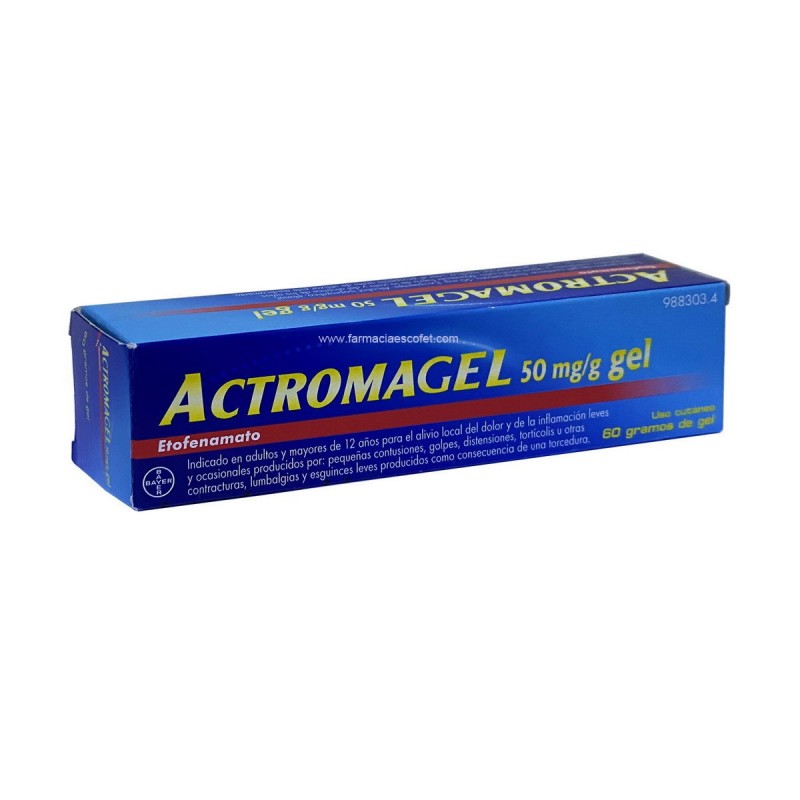



(Temporary unavailable)
Relief of pain and inflammation caused by: blows, contractures, sprains, torticollis, lumbago...
1. What is Actromagel and what is it used for
Etofenamate, the active ingredient in this medicine, belongs to the group of non-steroidal anti-inflammatory drugs and acts as a local analgesic and anti-inflammatory.
This medicine is indicated for the local relief of mild and occasional pain and inflammation caused by:
-small bruises, bumps, strains
-torticollis or other contractures
-Low back pain
-Mild sprains produced as a result of a strain
You should tell your doctor if it worsens or if it does not improve after seven days.
2. What you need to know before you use Actromagel
Do not use Actromagel if:
- If you are allergic (hypersensitive) to etofenamate, flufenamic acid, other non-steroidal anti-inflammatory drugs or any of the other ingredients of this medicine (listed in section 6 of the package leaflet).
- Do not apply on wounds, eczematous lesions, mucous membranes, or sunburns.
- If you have suffered allergic reactions (rhinitis, asthma, itching, difficulty breathing, hives, shock or others), caused by acetylsalicylic acid or other non-steroidal anti-inflammatory drugs.
- If you are in your third trimester of pregnancy.
Warnings and precautions:
Consult your doctor or pharmacist before using Actromagel.
- Do not apply on wounds or eczematous lesions.
- You must avoid contact with the eyes.
- Wash your hands after each application. Avoid contact with the treated body parts.
- Do not use occlusive bandages.
- Avoid using in large areas or for a period of time longer than recommended. Use exclusively on the affected area.
- You should not simultaneously apply Actromagel in the same area where other medications have been applied.
- Prevent children from coming into contact with the areas of the skin treated with the medicine.
- You should not expose the treated area to the sun during the treatment and for up to two weeks after it.
- If you suffer from asthma, chronic obstructive respiratory tract disease, hay fever, nasal polyps or chronic respiratory infections, consult your doctor before using this medicine.
- Avoid contact with the eyes and mucous membranes.
-Frequent applications can cause irritation and dryness on the skin.
Check with your doctor if you have:
gastroduodenal ulcer, ulcerative colitis, coagulopathies or bleeding.
hypertension or heart failure due to fluid retention or edema.
kidney failure or liver failure.
Children and adolescents:
Do not use in children under 12 years of age due to limited data on efficacy and safety.
Using Actromagel with other medicines:
Tell your doctor or pharmacist if you are using, have recently used or might have to use any medicine.
Although no drug interactions have been observed, it should not be used in conjunction with other products in the same area.
Pregnancy, lactation and fertility
If you are pregnant or breast-feeding, think you might be pregnant or are planning to become pregnant, consult your doctor or pharmacist before using this medicine.
The use of medications during pregnancy can be dangerous for the embryo or fetus, and should be monitored by your doctor.
Do not use this medicine during the third trismester of pregnancy, as it may prolong labor and contribute to bleeding in the mother and baby.
Lactation
Consult your doctor or pharmacist before taking any medicine.
During breastfeeding, this medicine should only be used in small areas and for a short period of time. At high doses it can cross the placental barrier and be excreted in breast milk.
Do not apply in areas around the breast to avoid possible ingestion by the infant.
Driving and using machines
No effect affecting driving or using machines has been reported.
3. How to use Actromagel
Follow exactly the instructions for administration of the medicine contained in this leaflet or those indicated by your doctor or pharmacist. If in doubt, ask your doctor or pharmacist.
This medicine is for cutaneous use.
The recommended dose is:
Adults and children over 12 years: Apply 3 or 4 times a day a portion of 5 to 10 cm of gel on the affected area, using a gentle massage until absorbed. Wash your hands after each application.
If symptoms worsen or persist after 7 days of treatment, you should consult your doctor.
If you use more Actromagel than you should:
Due to its cutaneous use, poisoning is unlikely. However, if you have used much more Actromagel than you should, it is recommended to remove the medicine by washing the affected area with plenty of water. Symptoms that may appear from overdose are: skin allergy, headaches, dizziness or stomach pain.
In case of overdose or accidental ingestion consult immediately your doctor or pharmacist or call the Toxicology Information Service, telephone 91 562 04 20.
LEAFLET